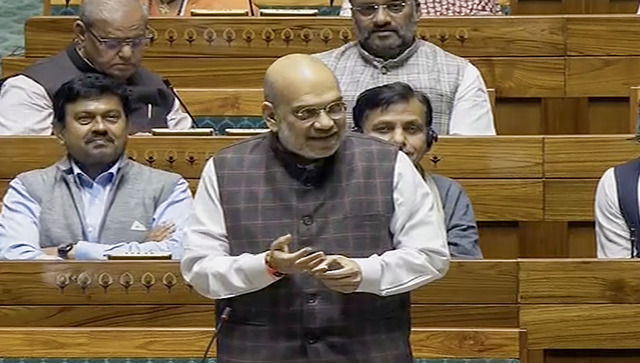Union Home Minister Amit Shah on Tuesday (12 December) introduced the three updated criminal law Bills in Lok Sabha to replace the existing criminal laws. Earlier this week, the Centre had withdrawn the three criminal law Bills introduced in August. The Union home minister said the revised bills have included changes recommended by the Parliamentary Committee of Home Affairs. “Grammatical and language errors have been corrected. The Bills were examined at length by the standing committee and it was necessary to include the suggestions. There are no major changes. Had we continued with the old Bills, several official amendments would have had to be made, so we decided to introduce new Bills instead,” Shah told the Lok Sabha, as per The Hindu. What’s new in these three redrafted Bills? Let’s take a closer look. Terror provision expanded The Centre has proposed to widen the definition of terrorism to incorporate threats to the “economic security” of the country. The Bharatiya Nyaya (Second) Sanhita, 2023, which seeks to replace the Indian Penal Code (IPC), 1860, defines a terrorist act as, “Whoever does any act with the intent to threaten or likely to threaten the unity, integrity, sovereignty, security, or economic security of India or with the intent to strike terror or likely to strike terror in the people or any section of the people in India or in any foreign country”. Under terrorism, the revised bill also includes “causing damage or destruction of property in a foreign country, intended for the defence of India or any other governmental purpose.” In the earlier version, it was only limited to government or public facilities, public places, private properties within India.
Any act that damages the “monetary stability of India by way of production or smuggling or circulation of counterfeit Indian paper currency, coin or of any other material” will amount to terrorism. The redrafted Bill further states: “Overawes by means of criminal force or the show of criminal force or attempts to do so or causes death of any public functionary or attempts to cause death of any public functionary… kidnapping or does any other act in order to compel the Government of India, any State Government or the Government of a foreign country….commit a terrorist act.” As per Hindustan Times (HT), the updated Bill proposes death or life sentence in case a terror act results in the death of a person. In other cases, a jail term ranging between five years and a life term is recommended. On ‘cruelty’ against women The revised Bharatiya Nyaya Sanhita bill defines “cruelty” against women to include harm to their “mental health”. The criminal code describes cruelty as “any wilful conduct, which is of such a nature as is likely to drive the woman to commit suicide, or to cause grave injury, or danger to life, limb or health (whether mental or physical)”. The updated bill retains the suggestion of the previous legislation that provided a jail term of three years for the husband and in-laws of the woman if convicted. This comes amid a recent National Crimes Record Bureau (NCRB) report which said that crimes against women increased by four per cent last year as compared to 2021. The report also stated that ‘Cruelty by Husband or His Relatives’ accounted for the most crimes against women. ALSO READ:
Capital punishment, lynching, sedition: How criminal laws could change
Other changes The BNS-Second has replaced the minimum sentence of a seven-year jail term for mob lynching with life imprisonment. The maximum punishment is still the death penalty. The offence of murder remains punishable either with a life term or death sentence. According to Indian Express, the Bill has brought back the phrase “unsound mind” and dropped “mental illness”. The earlier version of the criminal code had used “mental illness” as defence of the accused. Revealing the identity of a rape victim will be a penal offence. As per the revised Bill, printing or publishing any matter related to court proceedings without permission will attract imprisonment for two years. The judgments of the High Courts and the Supreme Court are not included in this. [caption id=“attachment_13499212” align=“alignnone” width=“640”] Revealing the indentity of a rape victim is a penal offence. Reuters (Representational Image)[/caption] The Bharatiya Nagarik Suraksha Sanhita, 2023, which will replace the Code of Criminal Procedure (CrPC), proposed community service as an alternate punishment for “petty” offences. The revised criminal code defines “community service as “work which the Court may order a convict to perform as a form of punishment that benefits the community, for which he shall not be entitled to any remuneration.” The Bharatiya Sakshya Adhiniyam, 2023 seeks to supplant the Indian Evidence Act, 1872. The revised versions of these three criminal law Bills will come up for discussion on Thursday (14 December), with Lok Sabha Speaker Om Birla allotting 12 hours for the same. The voting on the three criminal codes will take place on 15 December. With inputs from agencies
Revealing the indentity of a rape victim is a penal offence. Reuters (Representational Image)[/caption] The Bharatiya Nagarik Suraksha Sanhita, 2023, which will replace the Code of Criminal Procedure (CrPC), proposed community service as an alternate punishment for “petty” offences. The revised criminal code defines “community service as “work which the Court may order a convict to perform as a form of punishment that benefits the community, for which he shall not be entitled to any remuneration.” The Bharatiya Sakshya Adhiniyam, 2023 seeks to supplant the Indian Evidence Act, 1872. The revised versions of these three criminal law Bills will come up for discussion on Thursday (14 December), with Lok Sabha Speaker Om Birla allotting 12 hours for the same. The voting on the three criminal codes will take place on 15 December. With inputs from agencies
)